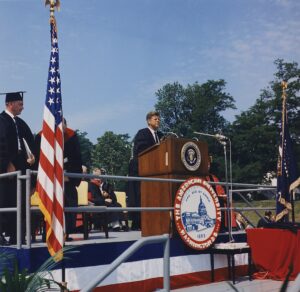JFK’s Peace Speech Got Him Killed
Yesterday, June 10, was the anniversary date of President John F. Kennedy’s famous “Peace Speech” at American University in 1963, which was about five months before he was assassinated in Dallas. It was that speech — specifically, the vision set forth in that speech — that got him killed.
The speech set forth a vision that Kennedy had for the future direction of America that directly conflicted with the vision that the U.S. national-security establishment had for the future direction of the country. It was that conflict of visions that led to the war that broke out between Kennedy and the national-security establishment, a war that the latter would win on the streets of Dallas.
The war actually stretched back to the Bay of Pigs crisis in 1961, when JFK threatened to tear the CIA to pieces and scatter them to the winds for lying to Kennedy in the run-up to the CIA’s invasion of Cuba. For its part, the CIA considered Kennedy to be a coward and a traitor for refusing to provide air support for the Cuban exiles who the CIA had trained to invade Cuba.
The Pentagon, as well as the CIA, were convinced that a communist Cuba posed a grave threat to the “national security” of the United States. Thus, after the Bay of Pigs fiasco, the Pentagon continually exhorted Kennedy to order a full-scale military invasion of Cuba. That’s what the top-secret Operation Northwoods was all about — to provide JFK with a fraudulent excuse to invade the island and effect regime-change there.
Then came the Cuban Missile Crisis, when the Soviet Union installed in Cuba nuclear missiles pointed at the United States. As far as the national-security establishment was concerned, JFK now had a justification for invading Cuba and replacing the Castro-led communist regime with another U.S. puppet, similar to the Cuban ruler who Fidel Castro had ousted from power, Fulgencio Batista.
Instead, Kennedy struck a deal with the Soviets that involved a withdrawal of the Soviet missiles from Cuba in return for Kennedy’s assurances that the U.S. would not invade Cuba and, also, that the U.S. government would withdraw U.S. nuclear missiles in Turkey that were pointed at the Soviet Union.
The U.S. national-security establishment was livid over what they considered to be Kennedy’s cowardice and treason. Not only had he blinked in the face of communist aggression, he had also agreed to let Cuba remain permanently under communist control, which meant a permanent threat to U.S. “national security.”
But it was with his Peace Speech that Kennedy really threw down the gauntlet. He declared that the United States and the Soviet Union would henceforth live in peaceful co-existence regardless of their ideological differences. That notion was anathema to the Pentagon, the CIA, the NSA, and the burgeoning military-industrial complex. For them, the notion that the United States and the communist world could live in peaceful coexistence was ridiculous and highly dangerous.
Soon after his Peace Speech, Kennedy entered into the Nuclear Test Ban Treaty with the Soviets, over the fierce opposition of the national-security establishment. He then ordered a withdrawal of U.S. troops from Vietnam, which the Pentagon, the CIA, and the NSA were convinced would begin a cascade of falling dominoes that would ultimately lead to a communist takeover of the Untied States.
Equally important, the national-security establishment knew that if Kennedy’s vision were to prevail, there would be no more justification for maintaining the U.S. government as a national-security state. In that case, the American people would undoubtedly demand the restoration of their founding governmental system of a limited-government republic.
It was a war to the finish — Kennedy’s vision, as set forth in his Peace Speech, versus the national-security establishment’s vision. On November 22, 1963, Kennedy lost the war and America has been paying the price ever since.
For more information, read FFF’s book JKF’s War with the National Security Establishment: Why Kennedy Was Assassinated by Douglas Horne, who served on the staff of the Assassination Records Review Board in the 1990s.



